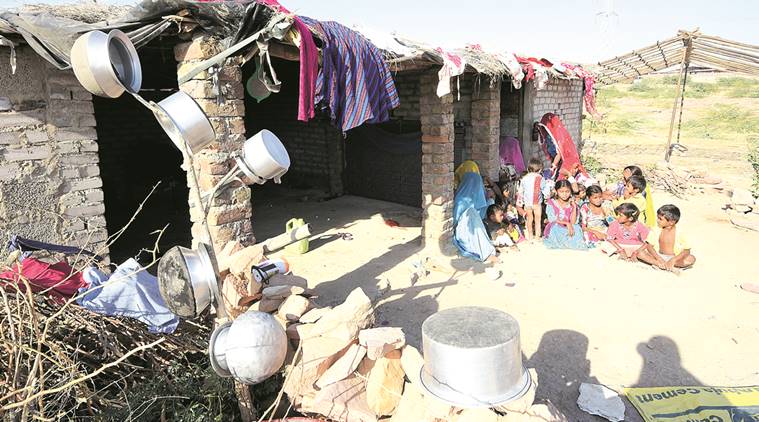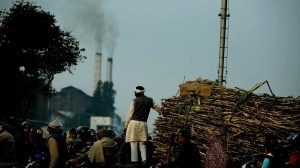- India
- International
Pakistani Hindu migrants bear the brunt of demonetisation in Jodhpur
The settlement of about 200-250 houses in Kali Beri came up about two decades ago and is among the largest for Pakistan Hindu migrants in the state.
 Pakistani Hindu migrants at Gangana village in Jodhpur. (Source: Express photo by Rohit Jain Paras)
Pakistani Hindu migrants at Gangana village in Jodhpur. (Source: Express photo by Rohit Jain Paras)
A couple of days after demonetisation of Rs 500 and Rs 1,000 currency notes was announced, Jogidas Bhil, 75, went and stood in a queue outside a bank. “It was all my savings, which isn’t that much. After several hours, when my number finally came, the bank official asked for my identity. I don’t have one. He then said ‘Baba, peche, peche (back, back), let the others come’ and I returned with the money,” Bhil says, one of the over 17,000 Pakistani Hindu migrants in Jodhpur.
“At our home in Rahim Yar Khan, people used to tell us all the time that we’re not Pakistanis but Hindustanis, so we decided to come here,” he adds. But though that was a decision taken 16 years ago, Bhil still doesn’t have an Indian citizenship or any identity card issued by the state government ot the Centre. While he says he is too old to work now, his sons Harji Ram, 41, Narsingh Ram, 35, and Chaman Lal, 32, work as labourers in sandstone mines, not very far from their settlement in Bhil Basti, Kali Beri, Jodhpur.
The settlement of about 200-250 houses in Kali Beri came up about two decades ago and is among the largest for Pakistan Hindu migrants in the state. Bhil heaps praises on Prime Minister Narendra Modi for the announcement, but says he wants to meet him “to tell him how there should be a camp for us. We don’t have lakhs or crores. Most of us have Rs 5,000 – Rs 10,000 a few may have Rs 15,000 – Rs 20,000. We just wish for a window where we can exchange our savings with our passports,” he says.
Hukma Ram, 30, arrived here from Rahim Yar Khan three years ago. The eldest of the labourer’s six children is 12 years old. “I had Rs 2,000 in demonetised currency. I stood in line but bank closed before I could be called in,” he said, unaware that he didn’t have any acceptable identity card. “I didn’t want to miss work next day too, and I had to feed my children and wife so I had to buy groceries for Rs 1,000 as the shopkeeper agreed to accept the currency only if I used it entirely.”
Kana Ram, 50, too arrived three months ago from the same district in search of “apna mulk, apna dharm (own nation, own religion)”. He has six children, of whom two are labourers, while four attend school. “I loaned some money. Main problem is arranging meals,” he says.

Though government has been granting citizenship to Pakistani Hindu migrants, the process, they say, is still slow and ridden with complications. The government had set up two citizenship camps since last year. But most of the people who came this year had come to inquire about the status of their application submitted last year, while officials say that most applications submitted last year had errors and the migrants could not be traced.
“In 2005, too, the government gave instructions to District Collector to grant citizenship to those living for five years. Some did get it. But one day, it was withdrawn all of a sudden. There were some — such as Halomal, Balam, Nemo and Basar — who submitted their passport with a fee but after the withdrawal of the decision, it was not returned to them. Basar passed away some time ago,” said Gordhan Bheel, 40, a migrant who works at a chemist shop. Having arrived on May 18, 2001, he still doesn’t have a bank account. “I had saved for the education and marriage of my children. We request the government to help us,” he says. “Each week, about 15-30 Hindu migrants arrive by Thar Express,” he says.
As per district officials, Jodhpur accounts for as much as 80 per cent of Pakistani Hindu migrants in Rajasthan as it is their arrival point aboard Thar Express.
In August this year, the Ministry of Home Affairs had also extended several facilities to minorities of Afghanistan, Bangladesh and Pakistan residing in India on a Long Term Visa, including issuing of Non Resident Ordinary bank account, a driving license, PAN card and an Aadhaar number, all subject to certain conditions.
This was conveyed to all the states, but migrants here say they are yet to avail benefits. Hindu Singh Sodha, an activist for Pakistani migrants, says that “nothing has happened on ground.” For example, August notification has not materialised into actual benefits for migrants due to delay in communicating or delegating power to authorities concerned or departments in the state.
Shaveta Dhankar, Foreigners Registration Officer for Jodhpur, says that “the state government wants to help the migrants and is working on addressing their concerns. We will be setting up a camp for granting LTV soon. There is a huge number of Pakistani migrants in Jodhpur — over 17,000 — so we have sought resources to conduct the process in an orderly manner.” Only once LTV is granted and relevant directions are given by the state government to authorities concerned, will the migrants be able to avail the facilities announced in August. Till then, some among them say that those with Aadhar card, obtained through ‘other means’, are better off.
In another migrant settlement at Gangana village in Luni tehsil of Jodhpur, Tikam, 48, says that “there is a difficulty in day-to-day activities now. Not that we had a lot of money but we have to run after relatives or acquaintances who might have an account,” he says.
Most of the families here belong to Sindh province of Pakistan. Rama, 35, who lived in Mirpur Khas till two years ago, said “We gave money to relatives. Bola k pass kara k do. (Asked them to turn it into acceptable currency).” His wife Bhuri says that they send their two children go to a school nearby and paying their fee is a cause of worry more than before.
Nagzi, now 52, who lived in Tando Allahyar district in Sindh province, said he was shattered once “when a sessions judge told me my claims lay not in Pakistan but in India. Now I don’t want to be broken for the second time with my family’s precious savings turn to waste paper.”
Apr 25: Latest News
- 01
- 02
- 03
- 04
- 05







































